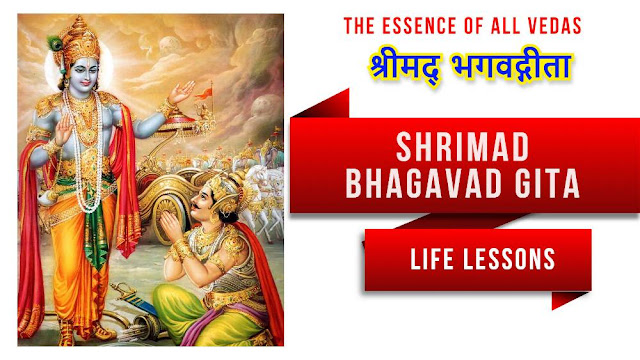What is Shrimad Bhagavad Gita
Shrimad Bhagavad Gita is a song sung by Lord Krishna himself and it is one of the best texts. It contains the essence of all the Vedas. Gita irrigates good values for the entire human race. Geeta is a treasure house of wisdom.
The truth of the world is contained in the Shrimad Bhagavad Gita. There is a solution to every human problem in the Gita. The essence of 700 verses contained in 18 chapters shows the truth of life and tells how to live life meaningfully. The knowledge of the Gita will help in fighting every difficulty.
Today human beings are facing a lot of difficulties in life so here are a few must-be-known points from Bhagavad Gita which can help the people understand the philosophy of life and resolve the issue themselves. Whether you are a working man/woman, student, businessman/woman, employer, or employee, Shrimad Bhagavad Gita might be a perfect guide for the one looking for knowledge and self-power.
Learnings from Shrimad Bhagavad Gita
Bhagavad Gita tells us the perfect and meaningful way to live life. It shows you the truth of life, teaches you the good and bad karmas, and makes you mentally strong.
It is not that only old people should read it, but people of all ages should read Gita so that they know the right way to live life and they can give the right direction to their life according to Bhagavad Gita knowledge.
I would suggest everybody must distribute the knowledge of Shrimad Bhagavad Gita to their children at an early age so that they move ahead with more confidence and they stand stronger in their life.
Let's understand a few but very important learning points from Shrimad Bhagavad Gita one by one. These are life lessons for all.
Also, read and understand the Gayatri mantra meaning, significance, and benefits.
🌸Chapter 6 Shlok verse -5
उद्धरेदात्मनात्मानं नात्मानमवसादयेत्।
आत्मैव ह्यात्मनो बन्धुरात्मैव रिपुरात्मनः।।6.5।।
Meaning
We can help ourselves. We should train our minds in such a way that with its help we can come out of the quagmire of ignorance. And lift yourself even higher. The mind is the friend of man and also the enemy. Conquer these wandering senses and make the mind your friend. If this mind continues to be influenced by different types of means, then it will become the cause of our downfall and if it is not influenced by all these and remains focused on our goal, then it can save us.
This tells us to be focused.
🌸Chapter 6 Shlok verse -6
बन्धुरात्माऽऽत्मनस्तस्य येनात्मैवात्मना जितः।
अनात्मनस्तु शत्रुत्वे वर्तेतात्मैव शत्रुवत्।।6.6।।
Meaning
As mentioned above in 6.5 that the mind is our friend as well as the enemy, it is understood here. One who has conquered the mind, that is, controlled the mind, for him the mind is a friend because, with a controlled and directed mind, we can achieve our goal. If our mind is uncontrolled and unguided, then it will keep us bound with worldly attachment and may become the cause of our downfall.
This tells us if we are focused we will surely succeed.
🌸Chapter 4 Shlok verse -17
कर्मणो ह्यपि बोद्धव्यं बोद्धव्यं च विकर्मणः।
अकर्मणश्च बोद्धव्यं गहना कर्मणो गतिः।।4.17।।
Meaning
One needs to understand the nature of Karma. This is very difficult but it is important to understand Karma (beneficial karma), Vikarma (baneful karma), and Akarma (no karma).
Here you understand Karma so that you are capable to choose and act as beneficial Karma.
Karma (beneficial karma) is the only way to progress in life.
🌸Chapter 8 Shlok verse -7
तस्मात्सर्वेषु कालेषु मामनुस्मर युध्य च।
मय्यर्पितमनोबुद्धिर्मामेवैष्यस्यसंशयम्।।8.7।।
Meaning
Here Krishna says that while performing your own duties in the world keep me in your thoughts or think of me. By surrendering your works to him and fixing your mind and intellect in him, you will surely attain him.
Surrender yourself completely to God while performing your duties in the physical world and you are with him.
🌸Chapter 3 Shlok verse -35
श्रेयान्स्वधर्मो विगुणः परधर्मात्स्वनुष्ठितात्।
स्वधर्मे निधनं श्रेयः परधर्मो भयावहः।।3.35।।
Meaning
It is better to perform one's duties (Dharma) in a faulty manner than to perform the actions of others well. This means it is better to die doing one's own deeds (Dharma) than to engage in someone else's path or Dharma.
In this verse, it has been said that, follow your Dharma/your duties and do your Karma. If you leave your Karma-Dharma after seeing someone else, you will not get anything. For example, if sages get a boon from God by doing penance, then this is their Dharma, their Karma. A farmer practices his dharma by plowing the field, while a doctor performs his dharma by treating patients. Similarly, the Dharma or duties of a student is to go to school and study. If he does penance like a sage, how will he study and if not, how will he follow his Dharma?
Don't think about what someone else did and didn't do, you just focus on your Karma and Dharma. Pay attention to what you have to do and what are your responsibilities and how will you fulfill them? Even if it is not up to our expectations, we cannot give up our responsibilities, we cannot run away from our Karma. It means that you keep doing your work and if you have done good deeds, then you will definitely get good results from it.
Here you understand the importance of your own duties and their priorities.
🌸Chapter 2 Shlok verse -47
कर्मण्येवाधिकारस्ते मा फलेषु कदाचन।
मा कर्मफलहेतुर्भूर्मा ते सङ्गोऽस्त्वकर्मणि।।2.47।।
Meaning
Do your Karma/work without being attached to the result (or fruit). You should never consider yourself to be the cause of the fruits of your actions, nor should you ever be attached to non-actions.
So here you are advised to simply act as per your duties or responsibilities without expecting anything in return because you are not entitled to the fruits of karma. It means that you keep doing your work and if you have done good deeds in your own time, then you will definitely get good results from it. Whatever has been done with a sincere heart, God will definitely fulfill it.
So do your work without expecting anything in return, God will surely deliver the fruits as per your actions.
🌸Chapter 2 Shlok verse -48
योगस्थः कुरु कर्माणि सङ्गं त्यक्त्वा धनञ्जय।
सिद्ध्यसिद्ध्योः समो भूत्वा समत्वं योग उच्यते।।2.48।।
Meaning
In above verse 2.47, we have seen that we should do our Karma/work without being attached to the result (or fruit), then how should we act? Here is the answer in verse 2.48.
Here Krishna advises Arjuna to come out of attachment and perform his duty with 'Yog'. Yog means concentrating the god (the supreme power) with senses in control. By following Yog, become one with the supreme almighty and perform your duties.
When you act with 'Yog' then success and failure, they do not bother you because your senses are in control.
🌸Chapter 16 Shlok verse -1,2,3,4,5
अभयं सत्त्वसंशुद्धिः ज्ञानयोगव्यवस्थितिः।
दानं दमश्च यज्ञश्च स्वाध्यायस्तप आर्जवम्।।16.1।।
अहिंसा सत्यमक्रोधस्त्यागः शान्तिरपैशुनम्।
दया भूतेष्वलोलुप्त्वं मार्दवं ह्रीरचापलम्।।16.2।।
तेजः क्षमा धृतिः शौचमद्रोहो नातिमानिता।
भवन्ति सम्पदं दैवीमभिजातस्य भारत।।16.3।।
दम्भो दर्पोऽभिमानश्च क्रोधः पारुष्यमेव च।
अज्ञानं चाभिजातस्य पार्थ सम्पदमासुरीम्।।16.4।।
दैवी सम्पद्विमोक्षाय निबन्धायासुरी मता।
मा शुचः सम्पदं दैवीमभिजातोऽसि पाण्डव।।16.5।।
Meaning
Here in verses 16.1, 16.2, 16.3, divine qualities are described that make a man godlike naturally. They are -
fearlessness, purity of heart, steadfastness in knowledge and devotion, benevolence, control of senses, worship, the study of scriptures, austerity, uprightness, non-violence, truthfulness, freedom from anger, renunciation, tranquillity, aversion to slander, compassion to living beings, freedom from sensuality, gentleness, modesty, steadfastness, vigor, patience, fortitude, harmlessness, freedom from vanity.
In verse16.4, it is said that Pride, arrogance, ego, anger, harshness, and ignorance, these are all demonic qualities.
Verse16.5 says divine qualities lead you to liberation and demonic qualities lead you to bondage.
Here you find out the divine and demonic qualities so inspect yourself and look at the way you are in.
Divine qualities take you to progress while demon qualities take you to downfall.
🌸Chapter 5 Shlok verse -21
बाह्यस्पर्शेष्वसक्तात्मा विन्दत्यात्मनि यत्सुखम्।
स ब्रह्मयोगयुक्तात्मा सुखमक्षयमश्नुते।।5.21।।
Meaning
The one who is free from the external world's experiences that arise from our five senses is one who is actually happy from within. Happiness is our true nature that lies within and does not depend on the external world.
Happiness is our true nature means we are effortlessly happy. Do not be dependent on external things for your happiness.
🌸Chapter 5 Shlok verse -22
ये हि संस्पर्शजा भोगा दुःखयोनय एव ते।
आद्यन्तवन्तः कौन्तेय न तेषु रमते बुधः।।5.22।।
Meaning
Happiness born from our sense organs is the source of suffering and the wise man never takes interest in such happiness. As we learned in verse 5.21 that happiness is our true nature so we are naturally happy. The happiness we get from the external world is momentary and it will vanish after some time so the wise people who know the secret of happiness are not dependent on these things.
Find happiness within not in the external world.
🌸Chapter 9 Shlok verse -22
अनन्याश्चिन्तयन्तो मां ये जनाः पर्युपासते।
तेषां नित्याभियुक्तानां योगक्षेमं वहाम्यहम्।।9.22।।
Meaning
Lord Krishna says, if someone contemplates him with all his heart, then he takes the worries of his life and household on himself.
Keep Lord Krishna in your thoughts, in your heart and all your worries will be taken care of by him.
These are the few life lessons learned from Shrimad Bhagavad Gita and many more leanings will be added in the future with all the details. Jai Shree Krishna.
































